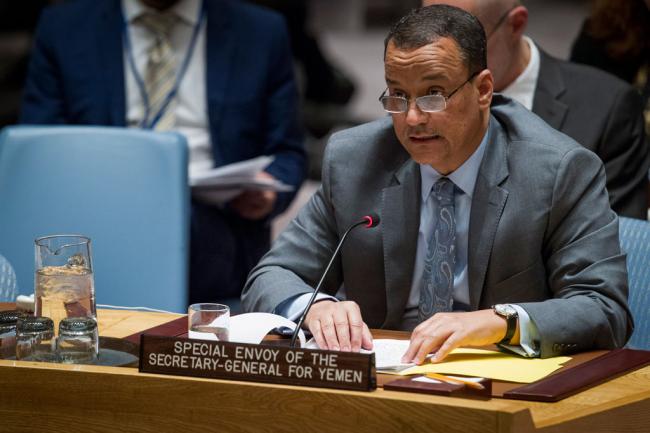
Yemen at ‘critical crossroads,’ Security Council told ahead of face-to-face peace talks
“This briefing comes on the eve of the next round of face-to-face talks in Kuwait, where I hope the parties will come to an agreement on a clear way to end the violence and devastation in Yemen,” Ismail Ould Cheikh Ahmed, the UN Special Envoy for Yemen, told the 15-member Council.
“The cessation of hostilities began at midnight on 10 April and I hope it will provide a conducive environment for the upcoming talks, offer the opportunity for expanded humanitarian assistance and provide a rare ray of hope for Yemenis’ longing for a return to peace,” he added.
The talks will commence on 18 April and aim to reach a comprehensive agreement, to end the conflict and allow the resumption of inclusive political dialogue in accordance with UN Security Council resolution 2216 (2015) and other relevant resolutions.
Meanwhile, in the last round of peace talks which took place in Switzerland, a committee was established – the De-escalation and Coordination Committee (DCC) – to prevent further violations and avoid any military escalation.
“The agreement on the cessation of hostilities also created local levels of support. The Government of Yemen and Ansar Allah have nominated local committees in militarily contested areas to work with the DCC and ensure better compliance with the cessation of hostilities,” the envoy indicated, adding that unfortunately, most of the local committees are not yet fully functional but should be in the coming days.
Despite a discernible decrease in the level of military violence in most parts of the country during the first days of the cessation of hostilities, Ould Cheikh Ahmed told the Security Council there have also been a worrying number of serious violations particularly in al-Jawf, Amran, Mareb and Taiz.
“Fighting in Taiz continues to cause civilian casualties and I am concerned that a spiral of escalation could threaten the success of the peace process,” he warned. “However, the recent events over the last weeks at the same time have given me hope. I would like to acknowledge the courage displayed by the Kingdom of Saudi Arabia and Ansarallah by accepting to settle border disputes.”
He said both parties confirmed that these agreements pave the way for the general cessation of hostilities in Yemen. “The Kingdom of Saudi Arabia has supported both the government of Yemen and the Houthis to sign a landmark agreement aimed at supporting the cessation of hostilities and the work of the De-Escalation, Coordination Committee and Local De-Escalation Committees and supports the role of the United Nations.”
Calling on all parties to support the important work which humanitarian agencies are carrying out, Ould Cheikh Ahmed underlined that humanitarians will continue doing their best to deliver assistance to those in need and negotiate sustained access to hard-to-reach areas.
Briefing on these efforts, the Assistant Secretary-General of the UN Office for the Coordination of Humanitarian Affairs (OCHA), Kyung-wha Kang, informed the Council that more than 6,400 people have now been killed, and over 30,500 injured. She said displacement has spiked, with some 2.8 million people now forced from their homes.
“Livelihoods have been ravaged,” Kang warned. “Some 14.1 million people now need help accessing adequate healthcare as a result of a year of intensified conflict. Lack of supplies, medicines, electricity, fuel for generators, and staff or equipment, have caused health services to decline across the country. Entire governorates have been engulfed in relentless violence.”
This includes locations such as Taiz where intensified fighting in and around Taiz city since mid-March has left scores of people dead and wounded, and also significantly hampered relief work.
“This paints a very bleak picture, but there is some cause for very cautious optimism,” she continued. “The cessation of hostilities is bringing calm to many areas of the country, reducing the crippling violence that has devastated these communities.”
Humanitarian organizations have also begun to respond in areas that were previously difficult to access, but despite these efforts, Kang told the Council that vital operations continue to be hampered by a variety of bureaucratic impediments, principally by the authorities on the ground.
Concluding her remarks, she said OCHA maintains the hope that the parties to this conflict will choose the only path to a solution – negotiation and dialogue – “no matter how challenging that path may seem.”
UN Photo/Manuel Elias
Support Our Journalism
We cannot do without you.. your contribution supports unbiased journalism
IBNS is not driven by any ism- not wokeism, not racism, not skewed secularism, not hyper right-wing or left liberal ideals, nor by any hardline religious beliefs or hyper nationalism. We want to serve you good old objective news, as they are. We do not judge or preach. We let people decide for themselves. We only try to present factual and well-sourced news.







